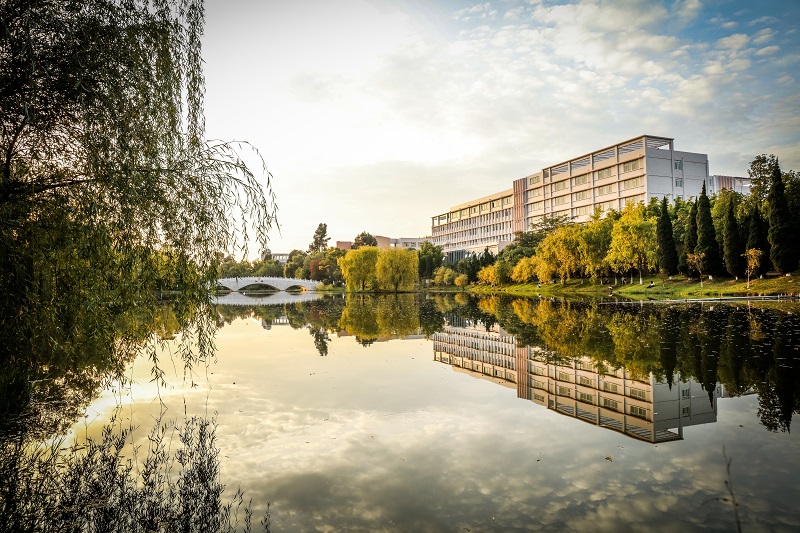Qujing Normal University is located in Qujing City, the birthplace of the Pearl River (i.e. the Zhujiang River and the third longest river in China), the second largest city in Yunnan, hometown of Cuan Culture, one of the “Top Ten Livable Cities in China”, National Civilized City. In 2007, it received a B rating in the undergraduate education accreditation by the Ministry of Education, and since 2010 it has been one of the universities enrolling high-quality students in Yunnan Province. From 2012 to 2015, it was successively named and commended as a “National Civilized Unit” by the Central Civilization Commission. In 2018, it became a provincial construction unit for master’s degree granting during 2018 to 2020. The university library is stocked with over 2.5 million books and nearly 100,000 GB of e-book resources. The total value of teaching and scientific research-related equipment and facilities is RMB 142 million Yuan. The University has won the titles of “Safe Campus” and “Advanced Unit of Landscaping”.
Qujing Normal University currently has 1049 in-service faculty and staff, 186 of whom are PhDs. There are 779 full-time teachers, including 84 teachers with senior titles and 253 teachers with deputy senior titles. Among the full-time teachers, 88 are employed as master’s degree graduate supervisors; 26 are titled as national or provincial outstanding experts and teachers who enjoy special expert allowance granted by the State Council or the provincial government, and are listed as provincial middle and young aged academic and technical leaders and backup talents. In addition, the University has 6 workshops for distinguished teachers of Yunnan Province.
Discipline and major structure with distinctive characteristics has been well established. Qujing Normal University currently has 18 teaching and research institutions, 8 provincial-level key disciplines including 1 plateau discipline of Yunnan Province, 3 construction disciplines for Master’s degree programs, and 2 key disciplines with advantages and characteristics. Besides, the University has 59 full-time undergraduate majors (including 19 teacher-training majors). The bachelor’s degree programs cover 9 major disciplines, namely economics, law, pedagogy, literature, history, natural science, engineering, management, and arts. The university provides 1 national characteristic (key) major for institutions of higher learning, 5 characteristic (key) majors for universities in Yunnan Province and 12 provincial excellent courses; it has 2 provincial construction projects of “Key Specialty Groups to Support Industrial Upgrading”, 1 provincial construction project for pilot universities of innovation and entrepreneurship education reform and 1 provincial construction project for an innovation and entrepreneurship education practice base respectively, 2 provincial high-level faculty construction projects, 1 Huang Danian teaching team in Yunnan Province, 3 Yunnan provincial experimental teaching demonstration centers, 2 provincial virtual simulation experimental teaching projects, and 1 provincial collaborative education program for outstanding talents in economics. There are 175 national and provincial teaching quality projects. In 2019, the University was selected as the “National Language and Character Promotion Base” and its 10 majors were selected as provincial first-class undergraduate specialty construction sites.
Qujing Normal University has established 1 research base of the State Sports General Administration, 1 language promotion base of the State Language Commission, 1 provincial philosophy and social science research base, 3 provincial key university laboratories, 2 provincial philosophy and social science innovation teams, 4 provincial university science and technology innovation teams, 5 provincial teaching teams, and 2 provincial-level experimental demonstration zones for talent cultivation mode innovation. It has undertaken 67 national research projects; published over 400 monographs, compilation works, collections of fine arts and textbooks; won 98 ministerial and provincial awards for outstanding achievements of varieties, 117 education and teaching awards at national, ministerial and provincial levels. It actively promotes the inheritance and innovation of Cuan culture, and conducts digital research and development of Cuan Longyan Tablet and Cuanbaozi Tablet, the “Treasure of South Steles”. In November 2017, “Qujing Normal University Er Cuan Peisheng Font Bank” was officially launched; in June 2020, “Da Cuan Jianguo Font Bank of Qujing Normal University” was launched and the “Cuan Style Calligraphy Font Bank” was first released.
International education is gradually deepening. Qujing Normal University has established “Qujing Branch of Yunnan Preparatory College for Studying Abroad”, become one of the third batch of Chinese education bases of Yunnan Provincial People’s Government. It cooperates with overseas universities like Chiang Mai University in Thailand, Mansfield University in Pennsylvania in the United States, Watford Institute of technology in Ireland, New Zealand College of Business and Lincoln University to carry out various forms of joint talent training projects such as “2 + 2”, “3 + 1”, “3 + 1 + 1” modes. In recent years, the University has established formal exchanges and cooperation relations with many foreign universities and educational organizations in many countries and regions, including those in the UK, the USA, Canada, Australia, New Zealand, France, Ireland etc; hired foreign teachers from the UK, the USA, Canada and Thailand to teach in the university over a long period of time; recruited 1000 long-term and short-term overseas students; and established an International Chinese Language Education Center in Thailand.

- Last: Empty
- Next: International Exchange and Cooperation Office Qujing Normal University